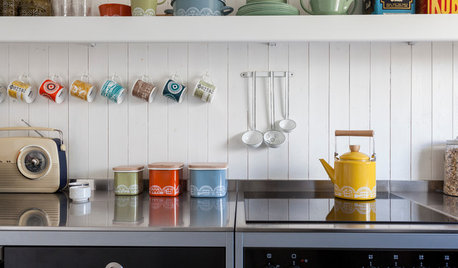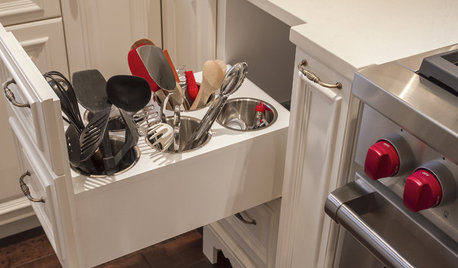Can I feed mostly tea bags and coffee grounds?
milocrab
13 years ago
Related Stories

LIFEHow Do You Make Your Tea and Coffee in the Morning?
A morning cup is a must for many, and preparation comes in many guises. We look at coffee and tea habits across the Houzz community
Full Story
KITCHEN DESIGNHot Ideas and Tips for Coffee and Tea Stations
Let options like drawer inserts and built-in coffeemakers percolate now, so your hot-drinks station can best serve holiday guests
Full Story
GARDENING GUIDES8 Native Shrubs for Year-Round Bird Feeding
It’s not just about berries. These plants provide insects for birds and seasonal interest for gardeners
Full Story
GARDENING GUIDES15 Native Flowers That Feed Native Bees
These perennials offer superfood to hundreds of bees and are gorgeous in their own right
Full Story
MOST POPULARThe 15 Most Popular Kitchen Storage Ideas on Houzz
Solve common kitchen dilemmas in style with custom and ready-made organizers, drawers, shelves and more
Full Story
LIFEThe Polite House: How Can I Tell a Construction Crew to Pipe Down?
If workers around your home are doing things that bother you, there’s a diplomatic way to approach them
Full Story
GARDENING GUIDES10 Tips to Start a Garden — Can-Do Ideas for Beginners
Green up your landscape even if you're short on time, money and knowledge, with these manageable steps for first-time gardeners
Full Story
BOOKSCan Tidying Up Result in Life-Changing Magic?
Organizing phenom Marie Kondo promises big results — if you embrace enormous changes and tough choices
Full Story
HOUSEKEEPINGCan-Do Cleaning Strategies for Busy People
While you dream of having a maid (to go with the cook and chauffer), this simplified cleaning routine can keep your real-world home tidy
Full Story
STORAGEWorld of Design: 11 of the Globe's Most Creative Storage Solutions
See the ingenious side of storage in France, Sweden, Russia and beyond
Full StorySponsored
More Discussions






sbryce_gw
plumiebear
Related Professionals
Wrentham Landscape Architects & Landscape Designers · Mount Wilson Landscape Architects & Landscape Designers · Mooresville Landscape Contractors · Berkeley Heights Landscape Contractors · Byram Landscape Contractors · Dedham Landscape Contractors · East Patchogue Landscape Contractors · Farmington Landscape Contractors · Rochester Landscape Contractors · The Villages Landscape Contractors · White Bear Lake Landscape Contractors · Halfway General Contractors · Poquoson General Contractors · Tyler General Contractors · University City General ContractorsmilocrabOriginal Author
coachgrumpy
plumiebear
equinoxequinox
iammarcus
plumiebear
milocrabOriginal Author
equinoxequinox
plumiebear
milocrabOriginal Author